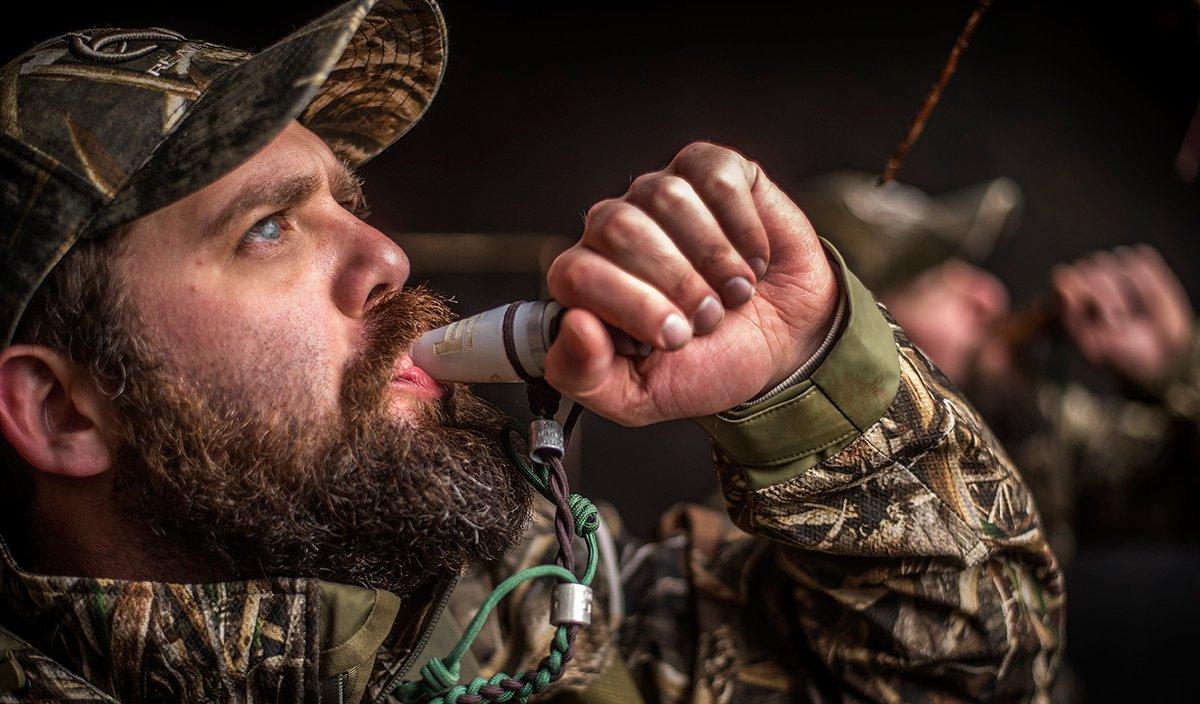When the ducks have heard everything, sound off with these tips in mind
Late-season duck hunting brings many challenges, including calling. Some days, it seems like birds have heard — and ignore — every sound you can utter.
Don't despair. Even the pros have days when ducks shun their best routines. But they adapt their approach to find notes that bring birds sure-kill close. Here are some of their top late-season calling tips.
1. Mirror What You Hear
Jeremy Dersham, owner of Ridge and River Running Outfitters, guides on Pool 9 of the Mississippi River, where almost every type of duck mixes during fall to gorge on wild celery. He carries several types of calls to mimic the diverse chatter he hears daily.
It's extremely common to have wigeon, teal, gadwalls, mallards and pintails loafing in small pockets and a few hundred yards away have redheads, canvasbacks and ringnecks rafted up, he says. And the sounds they all make are incredible. It doesn't take long to master a few sounds of each type of species. I personally want to emulate exactly what these ducks are doing and the sounds they are making when they are in their natural, relaxed environment.
2. Be Hidden
Dennis Dr. Duck Loosier, co-host of Black Cloud on Realtree 365, says hunters often forget that concealment is the most important factor when calling ducks.
Sometimes, they're looking to see where the call is coming from, and the ducks are not focused on the spread, he says. When they are focusing on the caller instead of the decoy spread, you have to be hidden — and hidden well.
3. Let Them Work and Turn
You've heard this umpteen times, but it holds true: When ducks are working in on their own, let them work. Justin Martin, general manager of Duck Commander, takes this traditional approach a step further.
I'll make a few little feeding calls, single quacks or drake whistles while they are looking at the decoys and losing altitude, he says. Once they pass and begin to bank, I will generally use a light greeting call, but you want to wait for them to turn on their own if they will. Most folks don't let them get far enough away before they call. They call too early and force the ducks to work tight, which will generally let them spot you. I prefer for them to make wide approaches and circles like an airplane. It just makes their life easier and more agreeable.
4. Don't Be Alarmed
James Buice, veteran Southern hunter and Realtree.com contributor, knows all about pressured Southern ducks, and he uses a careful calling approach.
I'll use single quacks (and be) careful to not do alarm quacks, which is what a lot of people do, he says. I rely more on feeding chuckles and low calling. Unless I lose them, we will get their attention with quacks and feeding calls mixed in, and then just let the birds work the decoys.
I prefer wooden calls for this — timber-style models that are really choked down in the barrel. And it's one of the few times I'll actually occasionally go with a double reed, but that's rare. It's really hard to beat a good wooden call for tone and mellow sounds.
5. Read the Ducks
Like many experienced callers, Loosier knows that timing and observation are critical when working birds.
Timing is knowing when to blow to get their attention using a cadence call and then when to blow to give them the confidence to come on in using a feeder call," he says. "We also can mix it up between the cadence and feeder call as well, to try to sound like a bunch of different ducks. Learning how to read the ducks as you are blowing the call takes experience. I always watch their wing speed, and that will tell you if you're making the sounds that they like or not. If their wing speed slows down, and they're floating in and ready to drop into your spread, you're doing something right. If the wing speed picks up after you get ducks' attention, you probably did something wrong, or someone is out of place.
6. Adjust for the Hour
Martin adjusts his approach during various times of day — something ducks do naturally.
If you listen to wild ducks, they are most vocal very early and very late, he says. During daytime hours, they don't make a ton of sound. So I try to mimic this same action while hunting. I will call more early in the mornings than midmorning. When it's tough for them to see, they depend on their hearing to zone in on their friends. Once the sun is up good, I call much less. There are several reasons for this. One is that's what real ducks do. Two, I want the ducks to focus on the decoys and not the caller. The more noise you make, the more likely they are to spot you.
Click here for more Realtree waterfowl hunting content. And check us out on Facebook.








